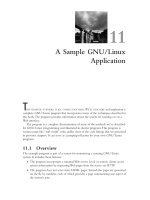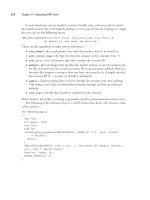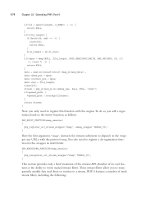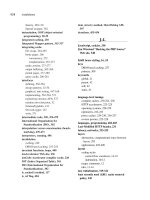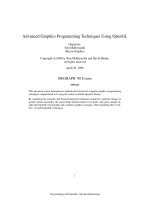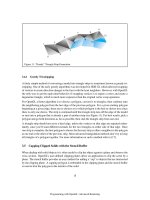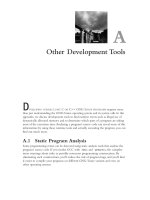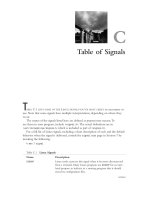STUDENT HANDBOOK AGRIBUSINESS MANAGEMENT (ADVANCED EDUCATION PROGRAM)
Bạn đang xem bản rút gọn của tài liệu. Xem và tải ngay bản đầy đủ của tài liệu tại đây (1.05 MB, 49 trang )
VIETNAM NATIONAL UNIVERSITY OF AGRICULTURE
FACULTY OF ACCOUNTING AND BUSINESS MANAGEMENT
STUDENT HANDBOOK
AGRIBUSINESS MANAGEMENT
(ADVANCED EDUCATION PROGRAM)
Academic year K60: 2015-2019
Hanoi, 6/2015
ii
CONTENTS
PART I. OVERVIEW ................................................................................................................. 1
1. OVERVIEW OF VIETNAM NATIONAL UNIVERSITY OF AGRICULTURE .............. 1
2. FACULTY OF ACCOUNTING AND BUSINESS MANAGEMENT ................................ 4
PART II. AGRIBUSINESS MANAGEMENT ADVANCED
EDUCATIONAL PROGRAM ................................................................................. 7
1. PROGRAM DESCRIPTION ................................................................................................ 7
2. PROGRAM OBJECTIVES AND EXPECTED LEARNING OUTCOMES ....................... 7
2.1. Program objectives (PO) ............................................................................................... 7
2.2. Expected learning outcomes............................................ Error! Bookmark not defined.
3. CAREER PROSPECTS ........................................................................................................ 7
3.1. Job opportunities ............................................................................................................ 8
3.2. Post-graduate study opportunities ................................................................................. 9
4. ADMISSION TO THE PROGRAM ..................................................................................... 9
5. EDUCATIONAL PHILOSOPHY, TEACHING AND LEARNING STRATEGIES ............ 10
6. ASSESSMENT METHODS ............................................................................................... 11
7. REGULATION OF ASSESSMENT AND ACADEMIC STANDARDS .......................... 11
8. STUDY PLAN (SAMPLE)................................................................................................. 12
PART III. COURSE CONTENT AND WORK LOAD ......................................................... 16
PART IV. USEFUL INFOMATION ....................................................................................... 24
1. UNIVERSITY SUPPORTIVE OFFICES FOR STUDENTS............................................. 24
2. SUPPORT STAFF IN FACULTY OF ACCOUNTING AND BUSINESS
MANAGEMENT ............................................................................................................... 27
3. RESEARCHS FOR STUDENTS........................................................................................ 27
4. EXTRA-CURRICULUM ACTIVITIES ............................................................................. 27
PART V. SOME REGULATIONS .......................................................................................... 28
1. UNIVERSITY TRAINING REGULATION FOR STUDENTS ........................................ 28
2. TUITION FEE WAIVER AND REDUCTION, SCHOLARSHIP AND
ADMINISTRATIVE ISSUES .......................................................................................... 28
3. OTHER REGULATIONS................................................................................................... 28
PART VI. SOME SAMPLE FORMS ...................................................................................... 29
iii
iv
PART I
OVERVIEW
1. OVERVIEW OF VIETNAM NATIONAL UNIVERSITY OF AGRICULTURE
Vietnam National University of Agriculture (VNUA) is a recognized as a key and
leading national university in human resource training and research in agriculture and
rural development. The University has been becoming more and more diversified in
fields of study with ever increasing prestige among the higher education system of
Vietnam.
VNUA dates back to the founding of the University of Agriculture and Forestry
on October 12, 1956. Since its foundation, the University has been renamed several
times (Figure 0.1). Through hardships, the University has had great achievements and is
striving to advance excellence in teaching and research. It has also shared its human and
material resources for capacity building towards the establishment of other universities
and research institutes in the country.
Figure 01. History and development of VNUA
March 2014 is an important milestone for VNUA when it was officially
transferred from the Ministry of Education and Training (MOET) to the Ministry of
1
Agriculture and Rural Development (MARD) with a new name: Vietnam National
University of Agriculture. The mission is to focus on research and addressing the major
agricultural and rural issues in Vietnam.
Missions, vision and strategy of vnua
Missions
The mission of Vietnam National University of Agriculture is to educate and
supply high quality graduates, while continuing our excellence in research, developing
new technology and providing the knowledge needed for the agriculture and rural sector
within Vietnam and the international communities.
Vision
Vietnam National University of Agriculture is continually striving to be an
autonomous, multi-disciplinary, and multi-campus institution; a major national, regional
research university that emphasizes excellence in innovation and development of human
resources and academic research, while developing new technology and disseminating
them into the agriculture and rural sector of Vietnam.
Core values - S.M.A.R.T
Solidarity
Morality
Advancement
Responsiveness
Transcendence
Educational philosophy of VNUA
To trainand nurture the agriculturalists of the future
TRAIN the mind for creativity
PRACTICE skills for proficiency
NURTURE the thought for nobility
INSPIRE the will for excellence
Strive to produce the AGRICULTURALISTS of the future
Strategy for VNUA development
The strategy is to develop VNUA to become a multi-disciplinary research
university based on a tri-functional axis:
- Social need-based education is the core drive for all activities;
2
- Scientific research and technological development is an important highlight;
- Domestic and international cooperation is to enhance capacity in education,
scientific research, and technology transfer so that VNUA can become a national
leading and regional advanced quality center in agriculture and rural development.
Vnua’s profile
Organizational structure
VNUA is applying the three-level administration model: University, Faculties Supportive Offices - Centers - Institutes - Companies, and Departments - Research
Centers - Laboratories - Supporting Teams. VNUA has 15 faculties, 15 supporting
offices, 14 research centers, 4 institutes and 1 company (Ltd.).
Currently, the numbers of staff are 1,460, of which 739 are lecturers and 671 are
supporting staff and officers. Concerning academic quality, 276 staff are PhDs, of
which 8 are professors and 85 are associate professors.
Training
VNUA has 98 Undergraduate Training Programs, 20 Master Training Programs,
16 Doctoral Training Programs, 4 associate programs and more than 30 short courses.
In addition to the traditional fields of study related to agriculture, VNUA has developed
new training programs in other fields in its trend towards a multi-disciplinary university.
Of particular note, the University has developed several advanced training programs and
joint training programs with foreign partners.
VNUA considers students the center of education and thus always creates the best
conditions for students following the motto “Learn to know, learn to do, learn to live
together, learn to be”. This teaches students to be well prepared for a life-long learning,
to work creatively with a high sense of responsibility and cooperation for the sake of
mutual benefit of self, the community, and the whole society.
Research and development
Since its early days, the University has laid down the combination of training with
scientific research and practical services, its key development strategies, under the motto
“Research is vital to the University”. Therefore, the University has gained remarkable
achievements in scientific research, social services and the transmission of cultural values,
especially in regards to agricultural production and rural development:
Up to current, the university has conducted 658 research projects at various levels,
from national to ministerial and provincial levels. The university has developed 17 crop
varieties, 05 recognized technical advances, 02 patents and various production and
management models at national level. Some outstanding achievements are two-line
3
hybrid rice varieties, heat tolerance tomato, soybean varieties, multi-microelement
fertilizers, vaccine against cholera in ducks, a kit for the diagnosis of “blue ear” disease
in pigs, pineapple foliage chopping and burying machine, a hole digging machine for
forestry tree planting, a cassava harvester, poultry egg incubators, agro-product dryers,
and a grain classifying and composting machine…
In addition, many other technical advances have also been recognized and widely
applied in practical production, including rapid multiplication of disease-free potatoes,
propagation of orchids and Cayen pineapple variety by tissue culture, enzyme
production technology, organic wastes treatment, application of GIS and remote sensing
in land use planning, basin management, agro-product preservation and processing, IT
applications in lecturing and management, commodity chain analysis, policy analysis,
and restructuring animal and crop production systems.
International cooperation
VNUA has built collaboration with more than 100 international universities,
research institutes and organization from various countries such as Japan, Belgium,
Australia, Korea, Thailand, and Philippine….. It has been constantly expanding in all
fields: staff and student exchange, information exchange, and cooperation in research
and joint training. The University has been receiveing national and international projects
and supports such as JICA project in period of 1998-2003, Vietnam-Belgium project for
higher education from 1998 up to now. Especially, the university will receive support
from Vietnamese government and WORLDBANK through ‘Enhancing capacity in
science and technology and human resources training to contribute to the National
Agricultural Restructuring and New Rural Development’ Project from 2018-2022.
Facilities and infrastructure
Situated on a campus of nearly 200 hectares, VNUA is one of the largest
universities in Vietnam with green and environmental friendly campus.
VNUA has sufficient facilities and infrastructure for teaching, learning and
researching such as offices, lecture halls, and libraries. Facilities for extra-curricular
activities include gymnastic and sport complex, athletic fields, etc. VNUA also has key
laboratories and large experimental fields. Recently, the University has received
new funding for library and laboratory upgrades, and development of technology
transferring models.
2. FACULTY OF ACCOUNTING AND BUSINESS MANAGEMENT
The Faculty of Accounting and Business Management (FABM) was established in
2007 being split from the Faculty of Economics and Rural Development. FABM has 5
4
departments: Business Management; Financial Accounting; Finance; Marketing;
Managerial Accounting and Auditing. In addition, it has the Center for Training
Cooperation and Consultancy.
Missions
To provide highly qualified graduates in the fields of agribusiness, business
management, and accounting.
To organize and conduct scientific research activities on agribusiness,
management, marketing, finance, and accounting.
To conduct consultancy and technology transfer in the fields of accounting and
business management in order to fulfill social requirements.
Visions
The FABM is one of the leading units in Vietnam and ASEAN in education and
research on accounting and business management for the agricultural sector, and
contributes to the socio-economic development of the country.
Core value
Take full advantage of internal sources and strive for a steady growth
Organizational Structure
Dean
Deputy Dean
In charge of Education
Deputy Dean
In charge of Scientific Research
The Faculty Office
The ABM Office
Department
of Financial
Accounting
Department
of Managerial
Accounting
and Auditing
Department
of Marketing
Department
of Business
Management
Department
of Finance
Training Programs
Undergraduate programs (4 years)
- Business accounting;
- Accounting and auditing;
5
- Business management;
- Financial management;
- Marketing management;
- Agribusiness;
- Agribusiness management
(:85/tientien/default.asp?Language=en)
Master programs (1.5-2 years)
- Business management.
- Accounting
R & D Focus
- Develop and apply the body of knowledge in social sciences, economics,
management, marketing for the benefit of the country’s socio-economic development;
- Supply chain management and market access for agricultural products;
- Business, agribusiness and marketing management;
- Rural credit and agricultural insurance;
- Quality management of public service.
6
PART II
AGRIBUSINESS MANAGEMENT
ADVANCED EDUCATIONAL PROGRAM
1. PROGRAM DESCRIPTION
Program title: Agribusiness Management (Advanced Education Program)
Degree name: Bachelor of Agribusiness Management (Advanced Education
Program)
Program code: 52903414
Type of program: Full-time
Program duration: 4.5 years
Language: English
Total required credits: 148 (123 Compulsory, 82% + 25 Elective, 18%)
Awarding Institution: Vietnam National University of Agriculture
The program was established in 2008 based on program of Wisconsin – Madison
University, Wisconsin, USA;
The program was established in 2008.
The previous versions of program specification were revised in 2011 and 2013.
2. PROGRAM OBJECTIVES AND EXPECTED LEARNING OUTCOMES
2.1. Program objectives (PO)
The main objective of the program is to educate and supply high quality
graduates, as competent managers for agriculture, agribusiness, rural and allied sectors
of the economy. The program caters to the needs of organizations serving both domestic
and international.
Specific objectives:
Student graduating
Education Program):
from
the
Agribusiness
Management
(Advanced
PO1: Having political quality, business morality, honesty, good motivation,
activeness and creativeness.
PO2: Being able to apply creatively the knowledge learned in the fields of
economics, business administration, agriculture and market research
7
PO3: Having enough qualification to continue to self-study, further study, and
conduct research.
PO4: Becoming businesspeople or leaders in agribusiness organizations after
graduation, and continuously accumulating practical experiences.
2.2. Expected learning outcomes
At the end of the study program, graduates are able to:
Contents
ELOs
Expected learning outcomes
ELO1
Apply scientific knowledge systems of socio political and
humanities in professional activities and life.
ELO2
Apply scientific knowledge systems of socio political and
humanities in professional activities and life.
ELO3
Apply scientific knowledge systems of socio political and
humanities in professional activities and life.
Specialized
ELO4
knowledge
Apply scientific knowledge systems of socio political and
humanities in professional activities and life.
ELO5
Apply scientific knowledge systems of socio political and
humanities in professional activities and life.
ELO6
Perform effective leadership and co-operation in team work.
ELO7
Conduct research on agribusiness.
ELO8
Use English in communication effectively (level B2)
General
knowledge
General
skills
ELO9
Professional
ELO10
skills
ELO11
Attitudes
Solve problems in the management of agribusiness and reality.
Make decision in agribusiness management.
Manage an agribusiness
ELO12
Perform awareness of social and environmental effects and
demands on agribusiness management
ELO13
Possess professional ethics and professional working manner
ELO14
Be ready to continue professional development plan towards
lifelong learning
3. CAREER PROSPECTS
3.1. Job opportunities
Bachelors of Agribusiness Management (ABM) can work in the areas and
positions related to:
Positions:
8
- Specialist in the field of agribusiness;
- Business project manager in the field of agriculture;
- Official manager of an import-export agency focusing on agricultural products
- Manager of an agribusiness organization
- International marketing specialist;
- International business management specialist;
- Sales manager in the field of agricultural products;
- Researcher and lecturer in related fields;
Work places:
- Domestic economic organizations: companies, manufactures, and enterprises in
agribusiness management;
- Institutions of training, research, and technology transfer in agribusiness
management;
- Enterprises specialized in trade, investment, services, and intellectual property,
and distribution in agriculture, forestry, and fishery;
- Factories, enterprises, foreign companies related to business management in
general and agribusiness management in particular.
3.2. Post-graduate study opportunities
The bachelors graduating from the Agribusiness Management (Advanced
Education Program) can continue to study further educations in business management,
agribusiness management and other related fields such as economics, marketing, and
agricultural finance in Vietnam and abroad.
4. ADMISSION TO THE PROGRAM
Applicants must satisfy the University's general and specific requirements for
admission to the program detailed below:
Vietnamese students
Eligible criteria:
Students must pass the national entrance exam to the University as regulated by
the Ministry of Education and Training in order to apply for the Agribusiness
Management (Advanced Education Program).
How to apply:
9
Students submit the application form to the Advanced Program office (Submission
time is announced on the university website 2-3 weeks after freshmen’s enrolment into
the University). Admission criteria and content of the entrance exam will be decided by
the president in each year, after students have been enrolled to the University.
Students selected for the Agribusiness Management (Advanced Education
Program) are required to take an English exam (the TOEFL test as minimum of 300
points) and hold current international English certificate.
International students
Eligible criteria:
Students who have graduated from high school or a higher education level.
How to apply:
Students submit their documents and receive the admission results at the
International Cooperation Office, VNUA. The documents include high school academic
transcripts, personal profile, and English language certification. The admission criteria
will be decided by the president of the University in each year.
5. EDUCATIONAL PHILOSOPHY, TEACHING AND LEARNING STRATEGIES
- Educational Philosophy: “To learn by discovery, to become good practitioners”.
- Teaching and learning strategy
The FABM teaching and learning processes are developed based on two principles:
(i) Learning only occurs if students are actively learning;
(ii) Learning takes place in social contexts. Students construct their own
understanding and knowledge of the world through their own experiences, and through
reflecting on those experiences.
The teaching and learning strategy of the Agribusiness Management (Advanced
Education Program) is to allow students to approach and master theoretical knowledge, and
to gain hands-on experience through practice. It is the student-centered strategy that creates
such value to students in the form of knowledge discovery, practical experience, faith,
learning motivation, fairness, cooperation, and flexibility. Learning is organized on the
basis of “To learn by discovery” and the “student-centered” basis, with an appropriate
curriculum, sufficient learning facilities, and a hands-on learning environment.
Teaching methods are designed and flexibly employed, depending on each
module and each stage of the training program. These methods include presentation,
games, case studies, and discussions between students. Teachers take the role of
10
facilitators, supporters who promote creativity learning, combine theories with practices
to encourage students “to learn by discovery, to become good practitioners”.
6. ASSESSMENT METHODS
Evaluation of the students in Agribusiness Management (Advanced Education
Program) is to evaluate the process and the completion of modules. Assessment
methods are designed to evaluate and measure the student's knowledge, skills, attitudes
and perceptions in each module. The assessment methods have clear and specific
criteria based on the rubrics, which is available to the students below:
- For assessment of the courses: students are assessed based on their participation
with the module, exercises, short tests; seminar, exercises, and group discussions; oral
tests, interviews, multiple choice tests, essays;
- Thesis is assessed by supervisor, reviewer and committee on knowledge, skills,
attitudes.
- In order to graduate from the program, ABM students have to finish program
with GPA of at least 2.0 and other administrative requirements.
7. REGULATION OF ASSESSMENT AND ACADEMIC STANDARDS
Grading system: 4
Summary of grade and mark classification
4-point scale GPA
No.
10-point scale GPA
Pass/Fail
Grade
Score
Classification
1
8.5 - 10
A
4.0
Pass
Outstanding
2
8.0 - 8.4
B+
3.5
Pass
Excellent
3
7.0 - 7.9
B
3.0
Pass
Good
4
6.5 - 6.9
C+
2.5
Pass
Good
5
5.5 - 6.4
C
2.0
Pass
Pass
6
5.0 - 5.4
D+
1.5
Pass
Pass
7
4.0 - 4.9
D
1.0
Conditional Pass
Conditional Pass
8
< 4.0
F
0
Fail
Fail
Summary of Degree classification
No.
Cumulative Point Average
Degree classification
1
3.60 - 4.00
Outstanding
2
3.20 - 3.59
Excellent
11
3
2.50 - 3.19
Good
4
2.00 - 2.49
Pass
5
< 2.00
Fail
Training process:
Students accumulate 148 credits (69 general credits, 21 foundation credits, 33
professional credits, 25 credits for field trip and thesis). Students must complete 3
credits for physical training, 11 credits for citizen military, 2 credits for IT and 6 credits
for soft skills. Courses are distributed over 9 semesters, equivalent to 4.5 years.
Award requirements:
Students are eligible to graduate upon accumulating a total of 148 credits from the
program; having a cumulative GPA of 2.00 or higher; having TOEFL ITP with
minimum score 550 or equivalent; having certificates of physical training and citizen
military training; having soft skills certificate; completting all tuition payments, and
fulfilling all other student’s obligations; submitting a written form to the Office of
Education Management for graduation.
8. STUDY PLAN (SAMPLE)
First year
Semester
Course
code
Course name
Credits
Total
Theory
Practice
1
KD01001 English 1
18
18
0
Compulsory
1
KD01017 Basic Principles of Marxism and Leninism 1
2
2
0
Compulsory
1
KD01018 Basic Principles of Marxism and Leninism 2
3
3
0
Compulsory
1
GT01001 Sport theory
1
1
0
Compulsory
1
QS01001 Citizen Military training1
3
3
0
Compulsory
2
KD01003 English 2
12
12
0
Compulsory
2
KD01002 Advanced Mathematics 1
3
3
0
Compulsory
2
KD01019
3
3
0
Compulsory
2
KD01020 Ho Chi Minh’s Ideology
2
2
0
Compulsory
2
QS01002 Citizen Military training 2
2
2
0
Compulsory
2
GT01003 Sport
Compulsory
The revolutionary policy of Vietnamese
Communist Party
1
1
0
Total compulsory credits
50
50
0
Total elective credits
0
0
0
Total credits for physical and citizen military training
7
7
0
Second year
12
Course status
Semester
Course name
Course
code
Credits
Course status
Total
Theory
Practice
3
QS01003
Citizen military training 3
3
0.5
2.5
Compulsory
3
QS01004
Citizen military training 4
2
0.5
1.5
Compulsory
3
KD01005
English 3
5
5
0
Compulsory
3
KD01004
Advanced Mathematics 2
3
3
0
Compulsory
3
KD01008
Microeconomics
3
3
0
Compulsory
3
KD01007
Introductory Animal Production
2
2
0
Elective
3
GT01002
Run 100 m - Jump
1
0
1
Compulsory
4
KD01006
Principles of Crop Production
2
2
0
Compulsory
4
KD01009
Accounting Principles
3
3
0
Compulsory
4
KD02006
Principles of Management
2
2
0
Compulsory
4
KD01016
English 4
5
5
0
Compulsory
4
KD01010
General Postharvest Technology
2
2
0
Elective
4
KD02001
Communication: Public Speaking
2
2
0
Elective
4
KD01012
Human Ecology
2
2
0
Elective
4
KD01016
Introduction to Psychology
2
2
0
Elective
4
KD01008
Ecology and Environment
2
2
0
Elective
4
KD02002
Probability and Statistics
3
3
0
Elective
1
0
1
Compulsory
1
0
1
Compulsory
Total compulsory credits
31
31
0
Total elective credits (minimum elective credits: 6/15)
15
15
0
Total credits for physical and citizen military training
8
1
7
GT01004
Choose 1 in 5:
GT01006
Football 1
GT01008
Volleyball 1
GT01010
Basketball 1
GT01012
Badminton 1
Chess 1
GT01005
Choose 1 in 4:
GT01007
Football 2
GT01009
Volleyball 2
GT01011
Basketball 2
Badminton 2
Third year
13
Semester
Course
code
Credits
Course name
Total
Theory
Practice
Course status
5
KD01010 Macroeconomics
3
3
0
Compulsory
5
KD03011 Human Resource Management
3
3
0
Compulsory
5
KD02004 Intro. of Marketing - Agri. Applications
2
2
0
Compulsory
5
KD03004 Field Trip 1
5
0
5
Compulsory
5
KD02007 Managerial Accounting
3
3
0
Compulsory
5
KT03042 Organizational Behavior
3
3
0
Elective
5
KT02006 Principles of Statistics
3
3
0
Elective
5
KT03014 Farm household economics
2
2
0
Elective
6
KD04012 Business Plan
3
3
0
Compulsory
6
KD03003 Strategic Management
3
3
0
Compulsory
6
KD03005 Corporate Finance
3
3
0
Compulsory
6
KD03006 Field Trip 2
5
0
5
Compulsory
6
KT02016 Econ Growth & Development in S.A.
2
2
0
Elective
6
KT02012 Econ Analysis of Agricultural Markets
3
3
0
Elective
6
KT02015 Business Statistics and econometrics
3
3
0
Elective
6
KT03036 Enterprise Statistics
3
3
0
Elective
6
KT02009 Research methods in economics
2
2
0
Elective
6
KT02005 Principle of Agricultural Economics
2
2
0
Elective
6
KT01006
Applied Informatics for Agricultural
Economics
2
2
0
Total compulsory credits
30
20
10
Total elective credits (minimum elective credits: 13/25)
25
25
0
Elective
Fourth, fifth year
Semester
Course
code
7
KD04030
7
KD04014
7
Credits
Course status
Total
Theory
Practice
Commodity Markets
3
3
0
Compulsory
Marketing Management
3
3
0
Compulsory
KD04013
International Business
3
3
0
Compulsory
7
KD03001
Cooperatives and Small Business
Management
3
3
0
7
KT03006
Natural Resource & Environ'l Econ
3
3
0
Elective
7
KT03043
Trade & Development
3
3
0
Elective
7
KD03111
Agribusiness Management
2
2
0
Elective
7
KT03044
Project management
2
2
0
Elective
7
KT03020
Agricultural policy
3
3
0
Elective
15
0
15
Total compulsory credits
27
12
15
Total elective credits (minimum elective credits: 6/13)
13
13
0
8
9
14
Course name
KD04050
Thesis
Compulsory
Compulsory
15
PART III
COURSE CONTENT AND WORK LOAD
KD01001. English 1 (18: 16 - 2; 36)
This course provides learners with sentence structures, basic expressions in
spoken language and vocabulary related to topics of celebrities, occupations, holidays,
cities, wildlife, sports, entertainment, tourism, events to help learners consolidate and
develop their listening and speaking skills in order to reach B1 level. Also, it helps
learners to distinguish sounds, apply correct pronunciation to sounds, words, sentences,
conversations and use knowledge of the culture of English speaking countries to solve
problems in new situations.
KD01003. English 2 (12: 12-0; 16; 24)
This course consists of 10 units about Jobs, Vacations, Cities, Wild life, Sports,
Culture, Beliefs; Experiences, Food and Charity.
KD01005. English 3 (05: 4-1; 14; 10)
This course consist of 10 units in Takeaway 3 book with contents related to daily
life such as fashion, job, entertainment, health, travelling and so on. Besides, this course
has 15 hours for practice under Developing tactics for listening with some topics to
enhance students’ practice and develop listening and speaking skills.
KD01016. English 4 (5: 5 -0; 10)
This course consists of 10 units about World Languages, Fashion, Life, Story,
Home, Charity, Health, Space travel, Experiences and Adventures. Main languages
items include vocabulary on the mentioned topics. Main grammar structures are tenses
(present simple, present continuous, present perfect, past perfect, future, and present
perfect continuous), clauses (time, reason, result, comparison and contrast) and aspects
(active, passive). Main skills include analyzing questions before doing tasks,
comprehending an ad, writing a letter for a certain kind of readers, understanding events
and stories based on chronological signals, making plans, scanning for main
ideas, listing information in a table/ chart, organizing ideas in a report, and predicting
before reading.
KD01017. Principles of Marxism - Leninism 1 (2: 2-0; 4; 90)
Introduction to basic principles of Marxism and Leninism, Dialectical
materialism, Materialist dialectics, Historical materialism.
16
KD01018. Principles of Marxism - Leninism 2 (3: l 3 - 0; 6; 135)
This course consists of 6 chapters focusing on the laws, economic principles and
normative issues socialist construction.in Marxism - Leninism theory.
KD01019. Revolutionary policy of Vietnamese Communist Party (3:3-0; 6, 135)
General module on: The birth of the Communist Party of Vietnam and the first
political program of the Party; The Way to Fight the Government of 1930-1945; The
resistance war against the French colonialists and the American imperialists invaded
1945-1975; Industrialization; The way to build a market economy, socialist orientation;
The way to build the political system; The way of building, developing culture and
solving social problems; Foreign policy.
KD01020. Ho Chi Minh’s Ideology (2: 2-0; 4; 90)
This course consists of 7 chapters: Chapter 1: Object, research methods and
significance of learning the subject of Ho Chi Minh's ideology; Chapter 2: Ho Chi
Minh's Thought on the issue of nation and national liberation revolution; Chapter 3: Ho
Chi Minh's Thought on socialism and the road of transition to socialism in Vietnam;
Chapter 4: Ho Chi Minh's Thought of Vietnam communist Party; Chapter 5: Ho Chi
Minh's Thought on national unity and international unity; Chapter 6: Ho Chi Minh's
Thought of building a state of the people, by the people, for the people; Chapter 7: Ho
Chi Minh's Thought on culture, morality and building new man.
KD03005. Economic Growth and Development in Southeast Asia (2: 2 - 0; 4; 90)
This course provides for students the Academic Knowledges of Economic Growth
and Development such as: Theories of Development Economics; Relationship of
National Domestic Resources and Economic Development; International Economics
Relationship and Economic Development; The Social, Economic and Environment
Problems in Development Process; Planning and Management of Economic
Development; And Practice of Economic Development in SEASelected Studied
Countries: Stages of Economic Development, Situation and Experiences, Advantages
and Disadvantages.
KD01006. Applied Informatics for Agricultural Econnomics (2:1.5-0.5; 4; 90)
This course consists of 3 main chapters that cover the following key contents:
Introduction to Excel and SPSS data analysis program, basic formulars and tools
applied for the field of agricultural economics and management. Data entry and
analysis. Some tools used for data analysis in the field of agricultural economics and
Business Management ( Advanced Education Program). Pratice of data entry and
analysis in labs and dicussion in calss and doing homeworks.
17
KD01010. Macroeconomic (3: 3-0; 6, 135)
This course deals with the content of opportunity costs and scarcity; Bridge and
supply of goods and services; Elasticity of demand and supply; Consumer choice; Cost
and production; Maximum profit; Perfectly competitive market; Exclusive market and
monopolistic competition; Market inputs; Market failure, government failure
and interference.
KT03031. Project management (2:2-0; 4, 90)
This course consists of 4 chapters about: Project management overview; Project
design management; Implementation Management; and Project closure.
KD02002. Organizational Behavior (3: 3-0; 6, 135)
This course consists of 9 chapters about: Project management overview; Project
management life cycle; The logical framework approach; Monitoring, review and
reporting and Project assessment.
KT02006. Principles of statistics (3: 3-0; 6, 135)
This course consists of 6 chapters about: Introduction and key statistical concepts;
Data collection; Sample survey; Organizing and presenting data; Descriptive statistics;
Correlation analysis.
KD03001. Cooperative and small business management (3: 3-0; 6; 135)
This course consists of 6 chapters, about Overview of Cooperatives and small
business (SMEs); Evaluate business opportunities of Cooperatives and Small
enterprises; Develop a business plan for Cooperatives and SMEs; Financial
Management of Cooperatives and SMEs; Marketing Management in cooperatives and
SMEs; Human Resource Management in Cooperatives and SMEs.
KD03011. Human resource management (3: 3-0; 6; 135)
This course includes 8 chapters, providing knowledge on: Overview on human
resource management; Human resource planning; Job analysis; Recruitment; Training
and development; Performance evaluation; Motivation; Labor compensation.
KD03111. Agribusiness Management (2: 2-0; 4; 90)
This course consists of 7 chapters aboutIntroduction of agricultural business
management, management and decision making, types of agricultural enterprises,
business and production planning, management of production capital, marketing,
corporate finance and risk management and uncertainty.
18
KD04013. International Business (3: 3-0; 6; 135)
This course consists of 7 chapters with the following contents: Globalization and
International business; Environment of International Business; International trade;
Foreign Direct Investment; The Foreign Exchange Market; Global strategy; Entering
foreign market.
KD04014. Marketing management (3: 3-0; 10; 135)
This course consists of 6 chapters with an overview of marketing management,
marketing strategy planning, competitive marketing strategies, product policy
formulation, strategic design and pricing policies, design and administration, marketing
channel distribution.
KQ4030. Commodity market (3: 3-0; 6; 135)
This course consists of 6 chapters: Chapter 1: Introduction of Commodity market;
Chapter 2: Analyse of Agricultural commodity’ prices difference through time; Chapter
3: Marketing margin; Chapter 4: .Price differences and quality in agricultural market;
Chapter 5: .Price differences in spacial relationship; Chapter 6: Price differences and
quality in agricultural market.
KD03004. Field trip1 (5: 0-5; 10; 225)
This course consists the following contents: Making internship plan; Develop
research proposal; Write literature review and research methodology; Understand the
development history, resources, and business performance of the company; Identify and
analyses Business issues and propose solution (focus on marketing, accounting, finance,
administration); Write final reports and present results in front of research committee.
KD01009. Principles of Accounting (3: 0-3; 6; 135)
Begin with an introduction to business and accounting, after which course
demonstrates how a typical accounting system works, the way accounting transactions
are recorded, the difference between cash-basis accounting and accrual-basis
accounting, the need for and the structure of adjusting entries/closing entries, how
inventories are accounted for, and the preparation and analysis of financial statements of
companies. Then present specific topics related to components of financial statements,
including cash and internal controls, accounts and notes receivable, plant and intangible
assets, liabilities, and stockholders’ equity.
19
KD02006. Principles of Management (2: 2-0; 4; 90)
This course consists of 7 chapters about Management and Management Theories;
Managers vs Leaders vs Entrepreneu; Information and Decision Making; Planning;
Organizing; Leading; Controlling.
KD03003. Strategic management. (3; 3-0; 6;135)
Overview on strategic and strategic management; leading through effective vision
and mission; examine internal environment; exploring external environment; strategic
development; development and selection of strategy; Evaluating, monitoring, and adjusting.
KD02004. Introduction of Marketing: Agri. Application (2: 2-0; 4; 90)
This course consist of principles marketing and agricultural marketing; market
and customer, marketing strategy in business. Agricultural and food marketing: market
analysis, Food Wholesaling and Retailing, Functional and Organizational
Issues,International Food Market.
KD02007. Managerial Accounting. (3: 3-0; 6; 135)
This course consists of 6 chapters about Managerial Accounting Concepts and
Principles; Job Order Costing and Analysis; Process Accounting and Analysis; Activitybased Costing and Analysis; Cost Behavior and Cost-Volume-Profit Analysis; Relevant
Costing for Managerial Decisions.
KD04012. Business Plan. (3: 3-0; 6; 135)
This course consist of summary, introduction of firm, target market analysis,
competitor analysis, marketing plan, production plan, human resource plan, and
financial plan.
KT02001. Communication: Public Speaking. (2: 2-0; 4; 90)
Fundamentals of Public Speaking; Forms of Public speaking; Basic Preparation for
your Public address; Preparing your speech; Steps to Deliver Public address. Delivering
public address; Some required skills to deliver public address; Individual activities.
KD02003. Business Statistics and Econometrics. (3: 2 - 1; 6; 135)
This course consists of 8 chapters about (i) Introduction to Business Statistics and
Econometrics; (ii) Review of Basic Statistical Concepts; (iii) Statistical Inference; (iv)
Statistical Applications in Quality Management; (v) Indexes; (vi) Simple Linear
Regression Analysis; (vii) Multiple Regression Analysis; (viii) An Overview of
Problems in Regression Analysis.
20
KD01012. Human Ecology (2: 2-0; 4; 90)
Human Ecology approaches and their practical applications for specific empirical
issue related to environmental, social and economic degradation in the existing
intensive farming practices; Concrete examples of innovations taken by farmers towards
more sustainable agriculture; Analyzing factors affecting farmers in making decisions in
farming and resources utilization/protection which provide bases for proposing
solutions for sustainable agricultural strategies.
KD01006. Principles of Crop Production (2: 2-0; 4; 90)
This course consists of 6 chapters about: Overview of crop production; Growth
and development; Climatic environment and soil; Crop nutrition; Cropping system and
crop establishment; Crop production practices.
KD03004. Natural Resource and Environmental Economics (3: 3-0-6; 135)
This course aims to help undergraduate students to understand the concepts and
problems in natural resource and environmental economics and economic instruments
for natural resource and environmental management, then to help them to analyze
environmental problems and policies in practices. The main contents of the course
include Introduction to Natural Resource and Environmental Economics; Environment
and Development; Economics of Pollution; Economics of Natural Resources;
Environmental Management Policies in Vietnam and other countries;
KT03020. Agricultural Policy (3: 2.5-0.5; 6; 135)
This course consists of 4 chapters with contents relating to: concept, rationale of
state’s intervention in economic and agricultural development, classification of
agricultural and food policy, agricultural and food policy formulation, agricultural and
food policy analysis, and agricultural and food policies including: land policy, price
policy, marketing policy, rural credit, technology transfer, agricultural trade, and food
policy.
KD03005. Corporate finance (3: 3-0; 6; 135)
This course consists of 6 chapters about: Introduction on corporate finance;
Financial statement analysis; Time value of money; Valuation of financial assets;
Capital budgeting.
KD03009. Trade and Development (3: 3 - 0; 6; 135)
This course consists of 5 theoretical chapters, and maintains discussion and group
exercise presentations. The main content of the course includes: Basics of
21
